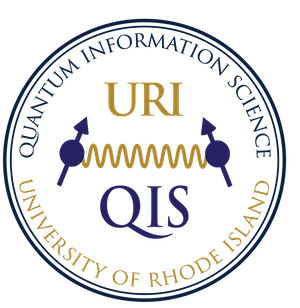URI’s Department of Physics celebrated the launch of its new M.S. degree program in Quantum Computing with the inaugural conference in Quantum Computing and Quantum Information Science (QIS) in October. Attendees enjoyed three days of programming led by pivotal QIS players in government, academia, and industry. Both the launch of the graduate program and the conference exemplifies the College of Arts and Sciences’ commitment to excite and prepare students to join the frontiers of the quantum revolution. While the future of quantum computing and QIS is uncertain, the groundwork is solid, and the development of a quantum workforce will impact everything from national security to the economy to quality of life. “Quantum computing could be a very effective way to design different types of drugs or therapies that we couldn’t possibly do with classical computers,” said Dr. Len Kahn, Chair of the Department of Physics. “The better prepared we are, the better advantage we’ll be able to take of the power of quantum computing.”
The first day of the three-day affair began with the Opening Keynote presentation by Prof. Jake Taylor, the founder of the U.S. National Quantum Initiative Act and first Assistant Director for Quantum Information Science at the White House Office of Science and Technology Policy. Soon after, Senator Jack Reed gave an address speaking to URI’s role in the pursuit for innovation with an emphasis on investment in research from the federal government and coordination between government and industry. Sen. Reed said, “URI’s initiative will help establish a new hub for quantum information science in the northeast and provide new opportunities for collaboration and groundbreaking discovery.” The evening session incorporated URI’s annual Alexander M. Cruickshank Lecture that was delivered by Prof. Umesh Vazirani, Co-Director of the Berkeley Quantum Computation Center at the University of California, Berkeley, and a founder of quantum computing algorithms. Prof. Vazirani’s lecture focused on the inner-workings of quantum mechanics and the future of the field. He emphasized that it is a field in its infancy with major challenges ahead in all aspects, but he says, “Often the most interesting activity happens at the boundary between things.”
The second day offered a roster of accomplished speakers on Quantum Simulation and Metrology, QIS education, and implementations. It finished with a roundtable discussion on the future of quantum computing sponsored by D-Wave with the Keynote presentation being offered by Dr. Charles Tahan. Dr. Tahan is the current OSTP Assistant Director for Quantum Information Science and National Quantum Coordination Office Director. The last day featured sessions focused on quantum algorithms, quantum computing in industry, and further discussion around implementations. The conference concluded after a comprehensive lecture from Sergio Bioxo, who leads the Quantum Computer Science group at Google Quantum AI. Dean Jeanette Riley provided a few closing words to reemphasize URI’s commitment to “develop a workforce training system that can be used as a national model.” Dr. Vanita Srinivasa, URI-QIS Program Director and member of the Conference Organizing Committee, offered the final remarks. “We at URI hope to have a program in this field now that can provide a nice balance point between research and education in this field,” she said. “We hope that this is going to be just the start of many very interesting discussions and new programs and a lot of excitement along the way.”
~Written by Sabrinna Fogarty

